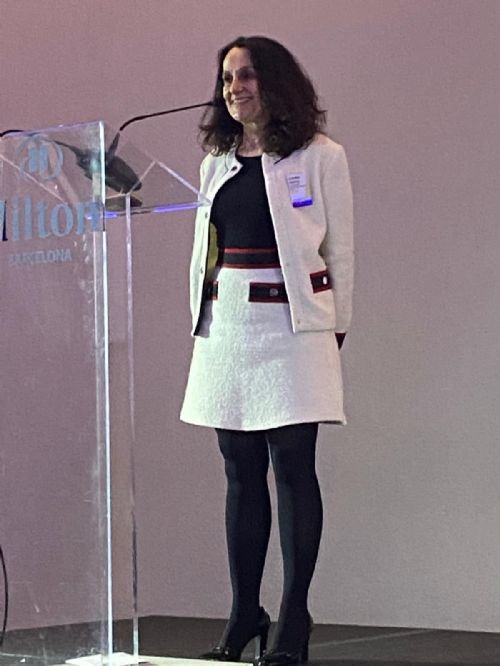Now in its twelfth year, Class 46 is dedicated to European trade mark law and practice. This weblog is written by a team of enthusiasts who want to spread the word and share their thoughts with others.
Click here subscribe for free.
Who we all are...
Webinar on IP and social media
 Registration is now open for the next MARQUES webinar, which takes place on Wednesday 4 June at 14.00-15.00 Europe time.
Registration is now open for the next MARQUES webinar, which takes place on Wednesday 4 June at 14.00-15.00 Europe time.
The webinar is hosted by the MARQUES Cyberspace Team and is titled: “Evolving Challenges and Infringements on Social Media”.
It will address the latest social media developments, including the emergence of new players and business models, and their impact on IP rights.
The webinar will feature industry experts who will share their experiences on tackling IP challenges on social media – including positive outcomes and common problems. The speakers are:
- Luca Barbero, Barbero & Associates Ltd, UK
- Linnea Harnesk, Autoliv AB, Sweden
- Kate Coffey, Zurich Insurance Company Ltd Switzerland
- Daniel Greenberg, Lexsynergy Limited, UK
The speakers will share tips and tools for monitoring IP infringements, securing takedowns and preventing IP abuse – and provide invaluable insights into the not-so-social aspects of social media.
This webinar is recommended for all in-house counsel and external advisers who deal with IP enforcement online. The fee is €75 (MARQUES members) or €125 (non-members).
To find out more and secure your place, visit the dedicated page on the MARQUES website.
Posted by: Blog Administrator @ 08.41Tags: webinar, Cyberspace, social media,


 Sharing on Social Media? Use the link below...
Sharing on Social Media? Use the link below...Perm-A-Link: https://www.marques.org/blogs/class46?XID=BHA5340
Changes to administrative trade mark revocation in Türkiye
 For the first time in Turkey, the IP law enacted in 2017 introduced an administrative revocation procedure before the Turkish Patent and Trade Mark Office. However, to ensure a smooth transition, its implementation was delayed until 10 January 2024.
For the first time in Turkey, the IP law enacted in 2017 introduced an administrative revocation procedure before the Turkish Patent and Trade Mark Office. However, to ensure a smooth transition, its implementation was delayed until 10 January 2024.
Previously, actions for revocation of trade marks based on non-use were filed as a court action before the specialized IP courts.
As of 10 January 10 2024, the Office has become responsible for handling revocation requests. However, at that date, the regulation on the implementation of the administrative revocation of trade marks was not published.
Due to uncertainties concerning the procedure, the Office started to accept revocation requests as “preliminary applications” but could not start examining them on the merits due to the lack of implementing regulation.
At long last, on 15 March 2025, the Office published a regulation amending the regulation on the implementation of the administrative revocation of trade marks. Accordingly, the Office will start examining the revocation requests on the merits. Mutlu Yıldırım Köse and İrem Girenes Yücesoy answer the key questions.
Changes in the Regulation
In general, the procedure outlined in the Regulation aligns with the IP Code, but there are some changes introduced by the Regulation.
One of the changes in the Regulation is the requirement to file a revocation request for each trade mark.
Previously, it was possible to file a court action requesting the revocation of multiple trade marks belonging to the same person or legal entity. However, with the new Regulation, a separate revocation request must be filed for each trade mark.
Fees
|
The provision is designed to protect trade mark owners from unfair applications as it allows them to be compensated to a certain extent for their efforts in proving the genuine use of their trade marks. |
Another significant change is the introduction of an escrow fee which is determined as TL23,458.33 + VAT for 2025 (around €700). This fee must be paid when filing a revocation request, in addition to the official application fee which was previously determined at the same amount.
The Regulation stipulates that the revocation fee consists of two components – the application fee and the escrow fee, which is held in an escrow account – both of which are collected in a single payment.
If a revocation request is entirely rejected, the escrow fee will be refunded to the trade mark owner upon request. If the request is fully accepted, the escrow fee will be returned to the revocation request owner.
This provision is clearly designed to protect trade mark owners from unfair applications as it allows them to be compensated to a certain extent for their efforts in proving the genuine use of their trade marks by receiving the escrow fee.
However, the Regulation also introduces a compelling provision stipulating that in cases where the revocation requests are accepted partially, no payment will be made to the parties, and the fee held in the escrow account will be recorded as income for the Office.
Thus, in order to avoid forfeiting the escrow fee, it has become crucial to file a revocation request directed at the goods and services for which the trade marks have not been genuinely used, and for the owners to prove the genuine use of their trade marks for all goods and services subject to the revocation request.
The provision of the Regulation establishing the escrow fee will not be applied retroactively to revocation requests submitted before its enactment.
Form and procedure
A revocation request must be submitted along with the required fee and a form containing key details, including:
- The registration number and the goods/services subject to the revocation request
- The ID and contact details of the request owner and, if applicable, their trade mark agent
- The grounds for revocation, along with any supporting information or documents
Upon submission, the Office grants the requester a one-month period to remedy any deficiencies, such as missing information, failure to pay the required fee or lack of supporting documents. If these deficiencies are not rectified within the given timeframe, the Office will dismiss the revocation request.
If the request is properly filed, the Office will invite the trade mark owner to submit evidence proving genuine use of the trade mark for the registered goods and services or to provide a legitimate justification for non-use. The trade mark owner has one month to submit this evidence, with the possibility of an additional month upon request. The Office may also request further documents or explanations if deemed necessary.
Similar goods or services
A new provision has been introduced in the Regulation, stating that “a revocation decision cannot be issued for similar goods or services.”
We believe this provision aims to ensure that a trade mark is not revoked for goods or services where genuine use has been demonstrated. However, this should not be interpreted as extending protection to similar goods or services.
Next steps
With the Regulation, the procedure on the implementation of the administrative revocation of trade marks has become clear.
It is now expected that the Office will notify the owners of preliminary applications to complete missing information and documents and proceed with examination of the revocation requests.
By Mutlu Yıldırım Köse and İrem Girenes Yücesoy of Gün+Partners in Turkey. Mutlu Yıldırım Köse is a member of the MARQUES Cyberspace Team
Posted by: Blog Administrator @ 16.44Tags: Turkiye, revocation,


 Sharing on Social Media? Use the link below...
Sharing on Social Media? Use the link below...Perm-A-Link: https://www.marques.org/blogs/class46?XID=BHA5339
The impact of deglobalization and protectionism on brand protection and strategy
 As the world witnesses a shift towards deglobalization and increased protectionism, most notably with the US leaving, or threatening to leave, numerous international organisations and treaties and/or terminating free trade agreements, trade mark practitioners must prepare for significant changes in brand protection and strategy.
As the world witnesses a shift towards deglobalization and increased protectionism, most notably with the US leaving, or threatening to leave, numerous international organisations and treaties and/or terminating free trade agreements, trade mark practitioners must prepare for significant changes in brand protection and strategy.
In this blog post, the MARQUES Intellectual Asset Management Team anticipate various scenarios and explore the potential implications of these trends, focusing on the challenges and opportunities that may arise for brands and their legal guardians.
The resurgence of local brands
One of the most immediate effects of deglobalization is the potential resurgence of local brands. As countries prioritize domestic industries and consumers become more inclined to support local businesses, traditional local brands may gain prominence.
This shift could mark the end of the recent trend of consolidating brand portfolios to save costs and reduce complexities.
Trade mark practitioners will need to adapt by focusing more on protecting local brand assets, ensuring they are well-positioned in their respective markets.
International collaboration and treaties
The possibility of countries disregarding international treaties, such as the Berne Convention and the Agreement on Trade-Related Aspects of Intellectual Property Rights (TRIPS), poses a significant challenge for trade mark protection.
As countries and governments decide not to feel bound by these treaties, multinational companies may need to reconsider their strategies, focusing on strengthening local brands to maintain market relevance. This could involve:
- Investing in local market research: Understanding local consumer preferences and cultural nuances will be crucial for developing strong local brands.
- Tailoring marketing strategies: Customized marketing campaigns that resonate with local audiences can enhance brand loyalty and market penetration. ·
- Collaborating with local partners: Forming strategic alliances with local businesses can provide valuable insights and facilitate smoother market entry.
Shift from global to national trade mark exhaustion
| It’s not unthinkable that in the light of the deglobalization, countries that previously adhered to the doctrine of global trade mark exhaustion may now adopt national exhaustion policies |
Article 6 of the TRIPS Agreement allows its members to choose their own exhaustion regime. Although we have not heard about countries considering changing their current exhaustion regime, it’s not unthinkable that in the light of the deglobalization countries that previously adhered to the doctrine of global trade mark exhaustion may now adopt national exhaustion policies.
This shift would mean that once a product is sold in one country, trade mark rights are not exhausted globally, allowing trade mark owners to control the distribution and resale of their products within each country.
Challenges in enforcing trade mark rights
Enforcing trade mark rights as a foreign trade mark owner may become increasingly difficult. Local procedural laws may require bonds or other security before granting access to courts, creating barriers for foreign entities.
| Enforcing trade mark rights as a foreign trade mark owner may become increasingly difficult. |
This situation may necessitate the establishment of more local entities or licensees who can act as the party taking action against trade mark infringements.
Practical implications for trade mark practitioners
- Staying informed about international developments: Keeping abreast of changes in international treaties and collaboration efforts is crucial. Practitioners must be proactive in understanding how these changes impact their clients and advising on the best strategies.
- Adapting to local markets: Trade mark practitioners must develop a deep understanding of local markets and regulations, ensuring that their clients’ brands are protected and promoted effectively within each jurisdiction
- Strategic portfolio management: With the potential end of brand portfolio consolidation, practitioners will need to advise clients on managing a diverse range of local brands, balancing the benefits of local relevance with the complexities of maintaining multiple trade marks.
- Navigating enforcement challenges: Practitioners must be prepared to address the procedural hurdles of enforcing trade mark rights in foreign jurisdictions, potentially establishing local entities or licensees to act on behalf of their clients.
This blog post was contributed by Michel Rorai and Mark Devaney, members of the the MARQUES IAM Team
Photo: Intisar Ali/Creative Commons
Posted by: Blog Administrator @ 14.59Tags: deglobalization, IAM, TRIPs, Berne,


 Sharing on Social Media? Use the link below...
Sharing on Social Media? Use the link below...Perm-A-Link: https://www.marques.org/blogs/class46?XID=BHA5338
Overview of online marketplaces and social media
The MARQUES Anti-Counterfeiting and Parallel Trade Team has compiled a guide to reporting infringing content on online marketplaces and social media.
The guide covers more than 30 platforms, including Alibaba, Amazon, eBay, Facebook, Indiamart, Lazada, Mercadolibre, Shein and TikTok.
 For each platform, the guide provides basic information including a link to the notice and take-down procedure, a summary of this procedure, details of which rights can be invoked, what evidence is required and any blocking mechanism available on the website.
For each platform, the guide provides basic information including a link to the notice and take-down procedure, a summary of this procedure, details of which rights can be invoked, what evidence is required and any blocking mechanism available on the website.
It also includes a summary of recent experience (positive, negative or neutral).
The guide has been compiled by members of the Team and is available to download from the Team page on the MARQUES website (log-in required).
Any enquiries should be directed to Stefan Schröter, Maria Cecilia Romoleroux or another member of the ACPT Team.
Posted by: Blog Administrator @ 15.02Tags: ACPT Team, online marketplaces, social media,


 Sharing on Social Media? Use the link below...
Sharing on Social Media? Use the link below...Perm-A-Link: https://www.marques.org/blogs/class46?XID=BHA5337
Last chance to book: Meet the Judges in London
There are still a few places available at the next Meet the Trade Mark Judges event, which takes place at UCL-IBIL on Tuesday 25 March (6.00 pm-7.30 pm).
MARQUES members can register at the discounted rate of £30 per person.
The meeting promises to be lively and informative as the chair, the Rt Hon Professor Sir Robin Jacob, will pose a set of pre-selected questions from the audience to the panel. The panellists are:
- Nina Korjus – Chairperson of the 4th Board of Appeal, EUIPO
- The Honourable Mrs Justice Joanna Smith – High Court
- Al Skilton - Senior Hearing Officer, UKIPO.
- Andrej Stec - Référendaire, EU General Court
More information and registration details are available on the UCL-IBIL website here.
Attendees can also submit questions for the panel to Roland Mallinson, MARQUES Exec member, by email until 21 March.
Posted by: Blog Administrator @ 10.20Tags: Meet the Judges,


 Sharing on Social Media? Use the link below...
Sharing on Social Media? Use the link below...Perm-A-Link: https://www.marques.org/blogs/class46?XID=BHA5336
New leadership team for MARQUES
 We are very pleased to let you know that Claudia Pappas of Thyssenkrupp Intellectual Property GmbH (Germany) took office as Chair of MARQUES at the Spring Team Meeting, held in Barcelona on 13-14 March 2025.
We are very pleased to let you know that Claudia Pappas of Thyssenkrupp Intellectual Property GmbH (Germany) took office as Chair of MARQUES at the Spring Team Meeting, held in Barcelona on 13-14 March 2025.
Claudia succeeds Antony Douglass of Specsavers Optical Group Ltd (UK), who has completed his two-year term.
Claudia joined Thyssenkrupp in 2016, having previously worked in private practice, and heads the trade mark department.
She was formerly 1st vice-Chair of MARQUES and has long been involved in the association, including on the Programming Team and the Corporate Focus Group.
Leo Longauer of LVMH (France) succeeds Claudia as 1st Vice-Chair and Tapio Blanc of F. Hoffmann-La Roche AG (Switzerland) becomes 2nd Vice-Chair.
All these appointments are for two years.
Claudia, Leo and Tapio talk about their plans and priorities for their terms of office in a special edition of the Talking MARQUES podcast, available on the MARQUES website and on Spotify.
Photograph taken by MARQUES External Relations Officer Alessandra Romeo
Posted by: Blog Administrator @ 15.10Tags: Claudia Pappas, Leo Longauer, Tapio Blanc,


 Sharing on Social Media? Use the link below...
Sharing on Social Media? Use the link below...Perm-A-Link: https://www.marques.org/blogs/class46?XID=BHA5335
Trade mark changes in Libya
The Libyan Trade Mark Office (TMO) has recently announced various changes which are of importance to brand owners with trade marks in the country.
- A resolution made in November 2024 and active from 1 January 2025 increases the renewal fees for foreign owners of Libyan trade marks to USD2000 per year, a total of USD20,000 for the 10-year term. This is a very significant increase and will likely result in some brand owners choosing not to renew marks in Libya or instead re-filing marks (with the associated loss of the earlier filing date).
- In early January 2025 notification was given by the TMO of the cancellation of any trade mark applications filed between 2 April and 2 September 2024, a period when the TMO operations were suspended. Applicants who filed marks during this time will need to re-file these applications, which may impact the priority date for these marks.
- A few days ago the TMO announced a new suspension of acceptance of new applications from 5 March until 10 April 2025. New marks cannot be filed during this time, although other operations including oppositions and renewals will continue. The suspension is to allow the TMO to process a backlog of work. Applicants intending to file Libyan marks during this period should take advice on how they can obtain the earliest possible filing date on the resumption of acceptance of applications and whether to use the new system at this time.
The MARQUES International Trade Mark Law and Practice Team are monitoring these developments and will provide updates if the situation changes.
Written by Jess Le Gros, a member of the Team.
Posted by: Blog Administrator @ 14.21Tags: Libya, International Team,


 Sharing on Social Media? Use the link below...
Sharing on Social Media? Use the link below...Perm-A-Link: https://www.marques.org/blogs/class46?XID=BHA5334

